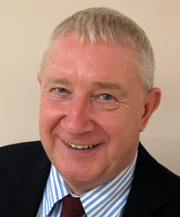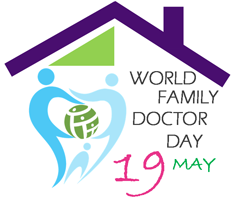From the CEO's desk: Family Doctor Day and more

Hello again from Bangkok.
In this month’s
WONCA News I want to report back on the Prince Mahidol Award Conference (PMAC) which is held each year in Bangkok, and which I’ve been privileged to attend for the past two years. This year’s theme was “
Global health post-2105: accelerating equity” looking to the time beyond the 2015 Millennium Development Goals (MDGs) and towards the 2030 Sustainable Development Goals (SDGs) as advocated by World Bank, WHO and others.
I also want to highlight World Family Doctor Day which, as ever, will be celebrated on 19th May. That is now less than three months away, and we want to encourage as many of our Member Organizations as possible to arrange events to celebrate this important health-related day in the calendar.
Prince Mahidol Award Conference
The Prince Mahidol Award was established in 1992 to commemorate the 100th birth anniversary of Prince Mahidol of Songkla, who is regarded as the father of modern medicine and public health in Thailand. The awards are bestowed on individuals or institutions that have made outstanding and exemplary contributions to the advancement of medical and public health and human services in the world. The Conference was initiated a few years later, and is held annually, focusing on health-related policy issues of global significance.
This year’s theme looked beyond the MDGs towards the 2030 World Bank Development Goals for 2030, also endorsed by WHO. Universal Health Coverage (UHC) – the ability to access health care regardless of ability to pay – was central to discussions about achieving these SDGs. It was vital that no-one should be kept in, or pushed into, poverty due to out-of- pocket expenditure, yet the World Bank produced the shocking statistic that over 100 million people are pushed into poverty annually as a result of out-of-pocket expenditure on health care. Rwanda and Ethiopia were cited as two examples of countries which had achieved significant health improvement, due to clear government leadership and increased domestic resources aligned with donor support.
Health equity was stressed – not “equality” but “equity”: that those who needed most resources received most help - but recognizing that everyone should have access to the quality health services they needed and were protected from public health risks.
But there was a strong recognition that health services alone could not provide all the answers. Social determinants of health are also crucial to produce healthy societies, through investing in water and sanitation; education; social protection; transport, gender equity; the environment; and many other factors, and not just health services. As an example, governments were urged to reduce or remove fuel subsidies, especially in light of falling oil prices, which would have the double benefit of potentially reducing road usage, and thus reducing pollution and improving the environment, whilst freeing up funds for investment in more productive sectors, such as health and education.
The MDGs had eight goals. The proposed SDGs have 17 goals and 169 targets. This was felt to be excessive, and with too many either couched in non-specific terminology or just frankly ambitious and possibly unachievable. Universal Health Coverage is currently only listed as a sub-goal, and consensus was that it needed to be a main goal, on which countries should be encouraged to focus. The wording of the sub-goal on UHC also gave cause for concern. The current wording is “Ensure healthy lives and promote well-being for all at all ages” but this was felt to be too vague and repetitive, and would allow governments to hide behind a non-specific non-target. Instead the delegates urged international funders and agencies to amend the wording to “Progressively achieve universal health coverage and ensure healthy lives for all”. This is still only 11 words, but is much clearer and more explicit in its aim.
Finally there was a clear recognition that governments need to commit to progressive universalism and had much to do in terms of training and up-skilling of adequate numbers of competent, committed health workers and to facilitate retention by providing adequate resources.
The theme for next year’s PMAC conference is “Priority setting for Universal Health Coverage”. Anyone interested in submitting an abstract can find further information
here. Abstracts must be submitted electronically and closing date for submission is 31st March 2015.
World Family Doctor Day – 19th May - was first declared by the World Organization of Family Doctors (WONCA) in 2010 and it has become a day to highlight the role and contribution of family doctors in health care systems around the world. The event has gained momentum globally each year and it is a wonderful opportunity to acknowledge the central role of our specialty in the delivery of personal, comprehensive and continuing health care for all of our patients. It’s also a chance to celebrate the progress being made in family medicine and the special contributions of family doctors all around the world.
Last year many of our colleagues across the globe celebrated the day by organising a variety of events and activities, and we received reports and photographs from many countries, which we were able to feature in WONCA News. This year Karen Flegg, the WONCA Editor, has even produced a template for countries and College and societies and associations, to aid reporting (you can find it
here)
This year we want to encourage even more organizations to celebrate in appropriate style on 19th May. We would love Member Organisations to tell us in advance of their plans – so that we can promote at least some in WONCA News – and then we look forward to receiving reports after the events to show and tell. WONCA News will publish as many reports as we can, to highlight the really wonderful work done by so many of our great Member Organisations. All news and reports should be sent to the WONCA editor
here.

Some posters - with our new World Family Doctor Day logo (pictured right) - are now available on the WONCA website, and we hope that these will prove useful for everyone. There are two suggested themes - “A family doctor for every family” and “Universal Health Coverage”, but we have also produced some blank posters in case organizations want to feature a local theme. Posters can be accessed and freely downloaded
here.
Until next month.
Garth Manning
WONCA Chief Executive Officer